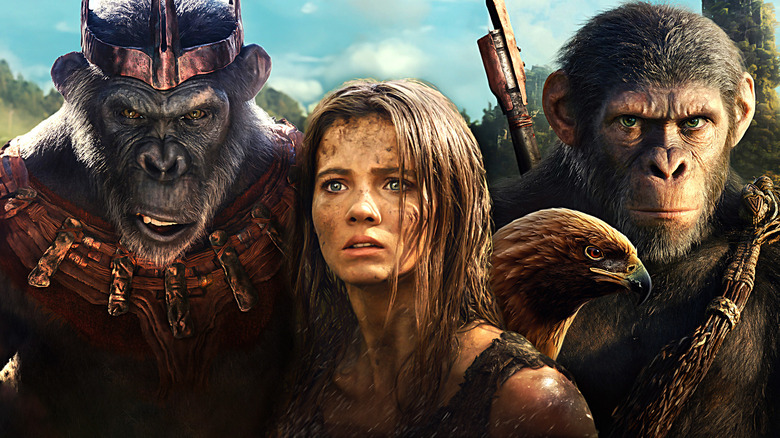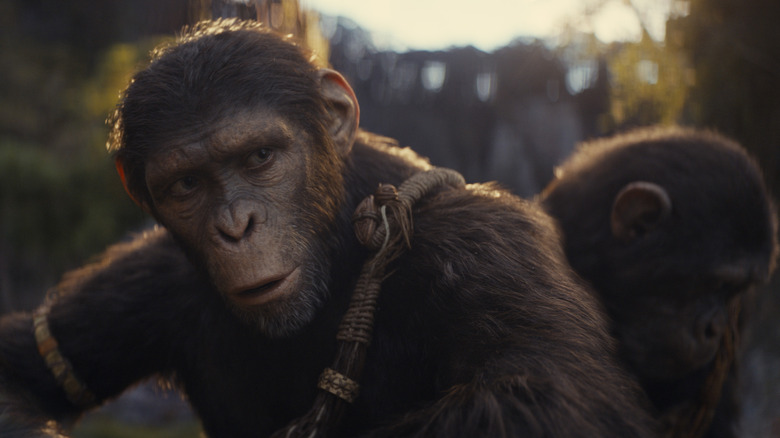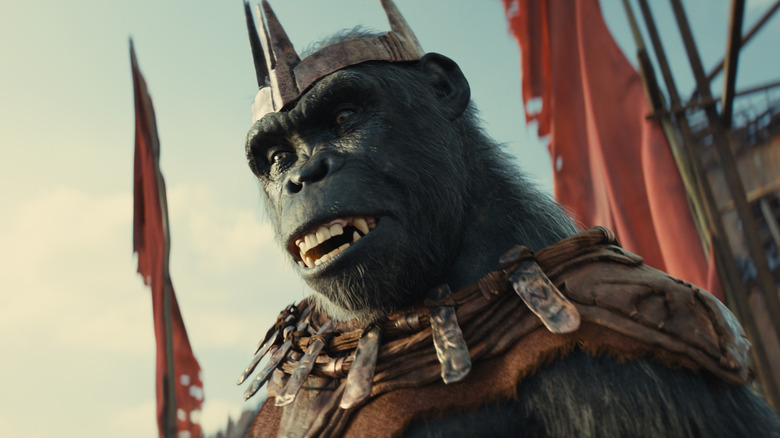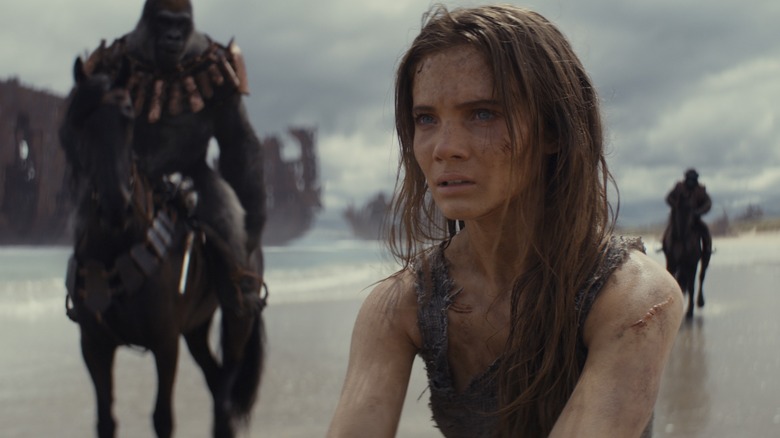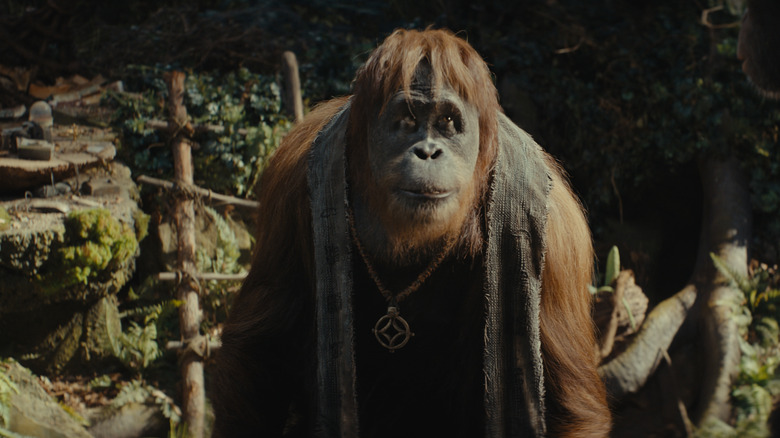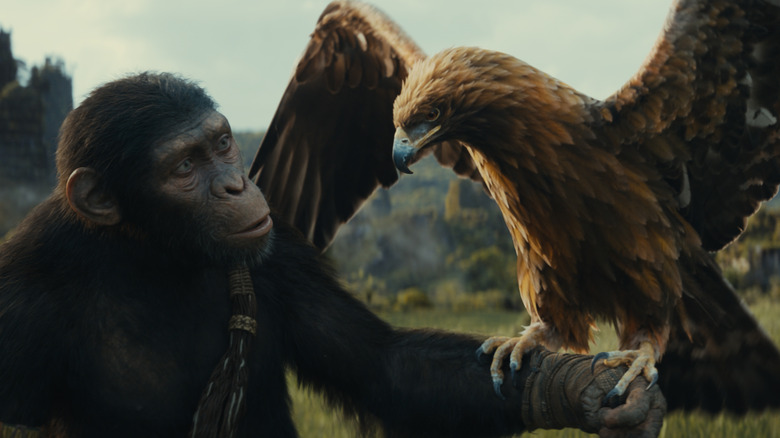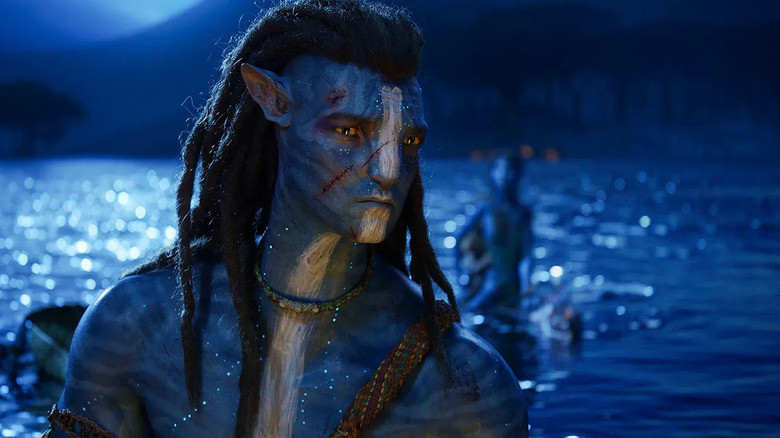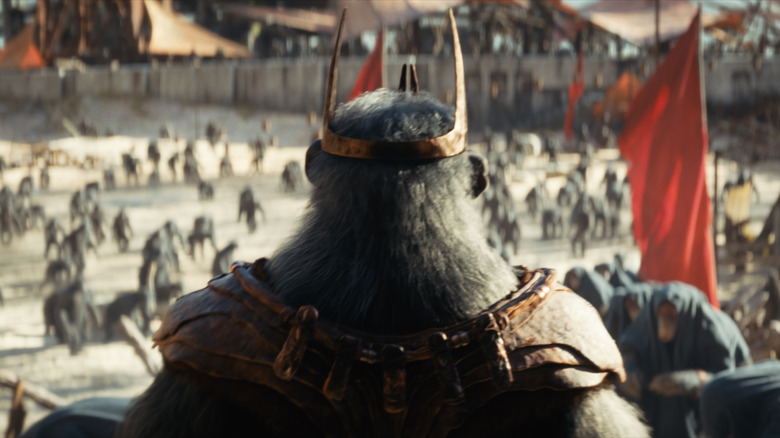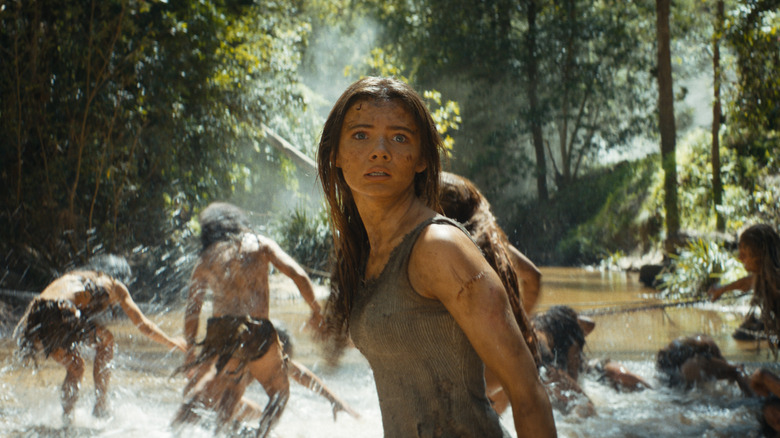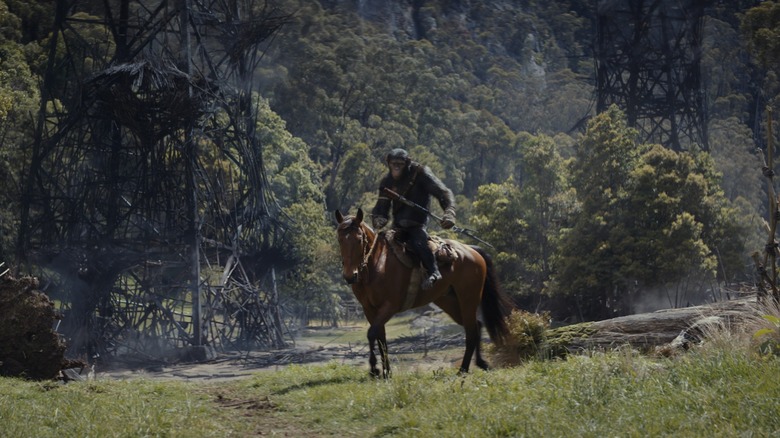Kingdom Of The Planet Of The Apes Ending Explained: Can Apes & Humans Live Harmoniously?
Contains spoilers for "Kingdom of the Planet of the Apes"
When it first hit theaters in 1968, nobody knew that twist ending in "Planet of the Apes" was coming — not even people who'd read the original novel by Pierre Boulle, where the planet of the apes was not Earth all along. The current run of prequel films, by their very nature, can't surprise audiences in the same way because we know where this is all eventually heading. Yet they continue to find compelling and socially relevant stories to tell about the fall of human civilization amidst the rising intelligence of our primate cousins.
"Kingdom of the Planet of the Apes" brings us to a new era in the post-apocalyptic "Planet of the Apes" timeline, long after the previous trilogy of "Rise of the Planet of the Apes," "Dawn of the Planet of the Apes," and "War for the Planet of the Apes" but still way before the events of the original film. Caesar (Andy Serkis) has become a figure of legend, and the apes, now in their Bronze Age, utilize that legend for conflicting purposes. Humans lost the war for the planet, largely wiped out by disease or gone feral, but as the film progresses, pockets of underground human society become visible.
Let's examine what this film's ending means for both the characters' personal stories and the ongoing interspecies conflict of the franchise, as well as what the filmmakers have said about it.
What you need to remember about the plot of Kingdom of the Planet of the Apes
"Kingdom of the Planet of the Apes" opens where "War for the Planet of the Apes" left off, with the funeral of Caesar, before jumping forward in time many generations later. Our new hero, the chimpanzee Noa (Owen Teague), is part of the Eagle Clan, an ape tribe that trains eagles for hunting. He's about to partake in his coming-of-age ceremony when an enemy army, led by the gorilla Silva (Eka Darville) and serving the tyrannical Proximus Caesar (Kevin Durand), attacks the Eagle Clan's village, killing Noa's father Koro (Neil Sandilands) and kidnapping the rest of his tribe.
Presumed dead, Noa heads out to find his family, followed by a seemingly feral human girl (Freya Allan). Raka (Peter Macon), an orangutan scholar dedicated to the original Caesar's teachings, joins the group and names the human Nova, but it turns out she can talk, is actually named Mae, and is far more intelligent than she's let on. Ambushed by Silva's army, Raka is swept away in a river, while Noa and Mae are captured and brought to Proximus' seaside kingdom.
Proximus is fascinated by human history and has been educated by a human supporter named Trevathan (William H. Macy). He wants to break into a vault filled with ancient human technology that he believes will hasten apes' evolution, but neither Noa nor Mae want this despot to acquire such potentially dangerous power. Mae, meanwhile, seeks a treasure within that she claims will let other humans speak.
What happened at the end of Kingdom of the Planet of the Apes?
Noa recruits his friends, Anaya (Travis Jeffrey) and Soona (Lydia Peckham), to join him and Mae on a mission to break into the vault themselves, during which Mae kills Trevathan. Inside the vault are guns, tanks, computers, and what may prove most useful for the apes' evolution: alphabet books and picture books that can teach them literacy.
Proximus and his army are waiting when the vault gates open. The evil bonobo mocks Noa for trusting a human, and tries to force him to choose between saving Mae and saving Soona. Ultimately, no choice is needed: Mae shoots the ape threatening Soona and activates the bombs she set up on the dam to flood the vault and protect the contents. Many of the apes manage to escape the flooding vault, but Silva dies fighting Noa on the way out. Just as Noa makes it to safety, Proximus attacks him. Noa stands in defiance of the tyrant by singing — and the rest of the Eagle Clan joins in, a show of solidarity that summons their eagles, who attack Proximus and knock him to his doom with a steep fall.
As the Eagle Clan returns home, Noa and Mae say their goodbyes, uncertain whether there can ever be peace between their different species. Mae goes to a secret human base, giving them a hard drive acquired from the vault that reactivates a bunch of satellite dishes — making humans "speak" by putting them in contact with other humans.
The ending question: Can apes and humans live together?
"Kingdom of the Planet of the Apes" takes place in what appears to be more or less a post-human setting, but the ending makes it clear that humans are still potentially a force to be reckoned with. The thematic thrust returns to the ape vs. human struggle that powered the previous trilogy, with the promise that this next set of films will take the conflict in new directions.
The final conversation between Noa and Mae proves important for the movie's ambivalent framing. Though Noa hates the ways in which Proximus perverted Caesar's morals, he says that he believes Proximus was right in regard to humanity's untrustworthiness. "Humans will never give up, not until you claim all things for yourselves," Noa says to Mae, who responds by saying she only seeks to reclaim what originally belonged to humans.
Noa asks Mae whether Caesar's belief in coexistence between humans and apes can ever become a reality. When she answers, "I don't know," the camera shows us that she's holding a gun behind her back — a clear visual symbol for her mistrust and the real answer that she's probably formulating in her head. Yet Noa offers her a different symbol: the necklace Raka gave him to remember Caesar's teachings. The young simian hero still holds out hope for peace, even if it seems unlikely — and viewers familiar with the original "Planet of the Apes" films know that any potential peace he might be working for will not last.
Kingdom of the Planet of the Apes serves as a religious allegory
A story about a character named Noa washing away the destructive remnants of the old world with a flood isn't exactly playing it subtle about its connections to the Noah's Ark story in Genesis. Similar to the parallels between Caesar and Moses in Matt Reeves' films, Wes Ball frames "Kingdom of the Planet of the Apes" through the lens of a Biblical epic. Its most interesting commentary centers on the ways religions evolve and devolve over time.
Raka and Proximus represent two very different paths religion can take. Raka doesn't know the exact historical truths about Caesar's life, but his belief in the Caesar legend keeps him dedicated to the original teachings about nonviolence between apes and coexistence with humans. Proximus, in contrast, perverts Caesar's message of liberation and uses it for conquest and enslavement. When he chants "Apes together strong," he's not calling for strength in solidarity like Caesar did, but speaking literally about physical might — the more apes he kidnaps, the more brute "strength" he can muster to pry open the vault doors.
It's no coincidence that Proximus is a student of Roman history: his claim to the name "Caesar" feels closer to the model of the Roman emperors than the heroic ape leader. The conflation of the two "Caesars" even evokes how Christianity began in opposition to the violence of the Roman Empire, only to become the Empire's official religion in its waning years.
Ape shall not kill ape -- but other species shall
When Caesar violated his own rule of "Ape shall not kill ape" to kill Koba at the end of "Dawn of the Planet of the Apes," declaring his enemy "not ape" in order to feel better about finishing him off, it played as a great tragedy. In "Kingdom of the Planet of the Apes," this rule is remembered by Raka and omitted by Proximus, but Noa's relationship with it is trickier. Depending on your perspective, he's either broken the rule multiple times or gotten by on technicalities, relying on the actions of non-apes to do the necessary dirty work.
The human Mae takes responsibility for killing the ape that threatens Soona. Noa, Anaya, and Soona share some responsibility for the casualties in the flood, but again, the human takes the lead in that plan and can shoulder most of the blame. This dodge of ape responsibility reaches a comical extreme with Proximus' demise. His death by falling directly parallels Koba's, but since it's the apes' eagle companions who push him over the edge rather than any of the apes themselves, the film is able to play it off as a victory rather than the complicated moral defeat at the climax of "Dawn of the Planet of the Apes."
How Avatar: The Way of Water paved the way
The "Planet of the Apes" prequel series shares significant creative DNA with James Cameron's "Avatar" films. Rick Jaffa and Amanda Silver, who wrote "Rise of the Planet of the Apes" and "Dawn of the Planet of the Apes," continue to serve as producers on the series. In addition to co-writing "Avatar: The Way of Water," the pair are writing "Avatar 3" with James Cameron, which is also where they first worked with "Kingdom of the Planet of the Apes" screenwriter Josh Friedman. Both franchises make use of the motion capture mastery of the artists at Wētā FX.
The flood-based climax of "Kingdom" draws conceptual parallels to the sinking ship sequence in "Avatar: The Way of Water," and the technical challenges proved similar. According to the film's press notes, effects supervisor Erik Winquist used the technology developed for "The Way of Water" for the extensive water effects in "Kingdom." Notably, all of the water seen in the film is CGI.
In the press notes, Winquist credits the first "Avatar" for pushing performance capture technology to reach a point where the previous "Planet of the Apes" trilogy became possible, and says about the latest installments in both series, "'Kingdom of the Planet of the Apes' had a similar trajectory in the sense that we had just worked on 'Avatar: The Way of Water,' which vaulted performance capture forward, which we could then take out on location again."
What the end of Kingdom could mean for the franchise
"Kingdom of the Planet of the Apes" has been designed as the start of a trilogy, and the ending reveal of Mae's secret mission opens up many possibilities for where the series can go from here. Restoring communications between different factions of the secret human resistance could restart war with the apes — and if those communications are reaching space, then we're getting even closer to the original "Planet of the Apes."
But don't expect these prequels to catch up to Charlton Heston any time soon — "Kingdom" is set only a few hundred years beyond the present day, while the '68 "Apes" takes place in the year 3978. Speaking to Den of Geek, director Wes Ball pointed out multiple events in the timeline that could be entertaining to explore: "When did the Statue of Liberty get blown up? Where did the Lawgiver come from? Where do the Sacred Scrolls enter into it? There are so many little things that would be fun to play with as we fit into the lore of this awesome franchise that's spanned 50+ years."
However much of that greater lore gets worked into this trilogy, Ball confirmed to ScreenRant that the primary focus will be the dual protagonists, Noa and Mae. "The core relationship between these two," he said, "what they went through together, the things they learned about each other, both good and bad, is going to be hugely important to the drama that could unfold if we're lucky enough to make more."
What the director says about Mae's journey
Wes Ball also offered up his thoughts to ScreenRant on Mae's character arc over the course of the film. Emphasizing the importance of the ending reveal, he describes her as "an enigma that gets unwrapped slowly all the way up to the very last few minutes of the movie, where a door opens up to I think many more possibilities for the human species."
Trying to understand where she comes from and just how exactly her journey with Noa and Raka changes her, Ball said, "You could imagine her as a character learning about how apes were the cause of their downfall, which probably wasn't true. She has a certain idea of what these things are and she's forced to accompany two very gentle, nice apes. I think it really changes her idea of what apes are and what they're capable of."
Ball connects Mae's struggles with the general themes about societal conflict that fuel the "Planet of the Apes" franchise as a whole. While the exploration of these themes can become bleak at points, Ball frames the parallel stories of Mae and Noa in an optimistic light, saying, "I think they both are changed because of their experiences together. Hopefully for the better."
Fans will have to be patient for a sequel
Seven years passed between the release of "War for the Planet of the Apes" and "Kingdom of the Planet of the Apes," with the latter film taking five years to make. If Disney greenlights the remaining chapters of Wes Ball's proposed trilogy (and they almost certainly will if this one makes any money), fans might still have some long waits in store — but being patient will pay off if it guarantees that the quality of the sequels will be at least as impressive as that of "Kingdom of the Planet of the Apes."
"It'll take as long as it takes," Wes Ball told ComicBook.com. "Fortunately because this franchise is important to the studio we'll get it right like we did this one, took our time and got it right ... It takes time, the development itself, and my big thing is I do not want to go into prep when the script is not done."
Ball has had bad experiences with projects rushed into production without a finished script, and thinks Hollywood as a whole can benefit from taking time between sequels. But don't worry about having to wait too long, because it sounds like Ball already has plenty of story inspiration, saying, "We were thinking a lot about these questions when we were developing this script, so we have an idea where we wanna go and there's lots of room for great drama."
